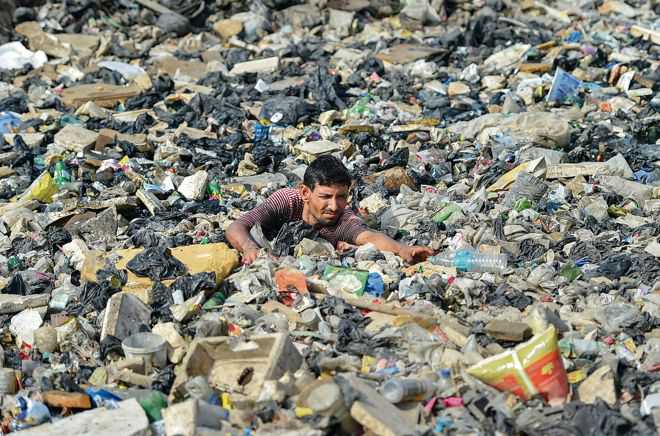
Missing the point: No political party has even acknowledged the elemental challenges the country confronts, let alone talk of ecological sanity.
Shyam Saran
Former foreign secretary and ex-special envoy of PM for climate change
THE multiple crises that confront humanity today, whether these relate to climate change, environmental degradation, social and economic inequality, or declining water, food and energy security, require a civilisational response. Why civilisational? Because the crises besetting humanity are integrally linked to and are symptoms of a deeper malaise embedded in our way of life, our value system, our understanding of the past and our aspirations for the future. Dealing with each crisis, as if it were a singular phenomenon occurring in a single domain, will not work. It is linked through feedback loops, to multiple domains.
A crisis in one part of our planet’s ecology may be linked to the crisis in another part. This may not be obvious because our current knowledge systems progress through ever-increasing specialisation and focus on the micro, abstracting from the macro. There are myriad threads that bind the planet’s fragile ecology. A small disturbance in one part may trigger large disruptions in other parts. These are compelling truths but are being denied in a fit of collective blindness. The reason is not hard to find. Acknowledging the truth will demand that we alter our lifestyles, change our value systems.
Our oceans are dying from the millions of tonnes of plastic and other hazardous waste being dumped into them. The capacity of the ocean, which is the planet’s largest carbon sink to absorb additional carbon dioxide from the atmosphere, is being diminished. This will exacerbate climate change. Non-degradable plastic is being ingested by underwater creatures. They are part of the foodchain for humans and pose health problems.
Ours is an age of technological hubris. There is a pervasive belief that somehow technology will find solutions we need without having to change our patterns of living. In the words of one scientist, ‘The outcome of future technological evolution could surpass humans by as much as we intellectually surpass slime moulds.’
But will our planet and life on earth survive long enough to see the wonders of this technological advancement? Ecology and biodiversity are interlinked and preservation and sustenance of biodiversity must be an indispensable component of ecological civilisation.
According to an environmentalist, biodiversity, in a philosophical sense, represents the knowledge learned by evolving species over millions of years about how to survive through the vastly varying environmental conditions. In this sense, humanity is currently ‘burning the library of life’ through the rampant destruction of biodiversity and alarming species loss. The interactions among species enable life to flourish. Without trees there would be no oxygen. It is the birds and the bees which enable pollination that enables fruits and nuts to grow. If destruction or exploitation of biodiversity crosses the threshold beyond which regeneration slows down and stops, life itself would be endangered. Climate change and environmental degradation are exacerbating this biodiversity loss. It is expected that one-third of bacterial parasites, which are a critical part of the biological chain, may be wiped out due to global warming. The rate at which species are becoming extinct is estimated to be a thousand times faster than before our industrial age.
So what would an ecological civilisation look like? Ecological civilisation would revere Nature as Mother, as a source of nurture and not as a dark force to be harnessed and conquered to satisfy the demands of a materialist society. It would embrace the notion of ‘Man in Nature’ not ‘Man against Nature’, recognising our interdependence with every living creature.
It would adopt a new definition of affluence in which clean air to breathe, a green Earth to walk on and clean and fresh water to drink would be as much markers of affluence as possession of a TV, a smartphone or a car.
Our value system is reflected in our economic accounting system. We need to alter it to reflect the true value of our ecological assets and the value of ecological services which they make available to humanity. As long as a dead tree cut down in a forest and sold as timber is more valuable than a living tree growing in it, forests will continue to be cut and biodiversity loss will continue unabated.
An ecological civilisation must be an egalitarian civilisation. India’s current strategy of development is unsustainable and will eventually become incompatible with a democratic polity with equal citizens. The model that both China and India aspire to is the kind of affluence we see in developed Western societies. We celebrate our billionaires and our becoming an increasing market for luxury brands. The demands of a privileged minority in India corner an ever-increasing share of government expenditures, for example, in constructing expensive flyovers and additional roads for a private car-owning population, rather than catering to the lack of mobility of the vast majority and acquiescing in the expropriation of land and other resources from tribal and rural communities without ensuring sustainable livelihoods and minimal welfare for them. The debate is conducted in a false idiom of balancing development and environment.
This is election season in Indian but no political party even acknowledges the elemental challenges our country confronts, let alone chart out a path towards ecological sanity. India can be a pioneer. Firstly, we possess deep-rooted cultural values which have not been entirely swept aside by the mimicking of the affluent life-styles prevalent in the industrialised world. Secondly, we are not yet fully locked into a resource-intensive pattern of growth and most of our infrastructure remains to be built. Unlike China, we still have choices available to us. Let us exercise the right choices before it is too late.



























